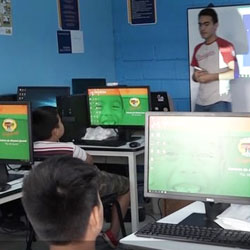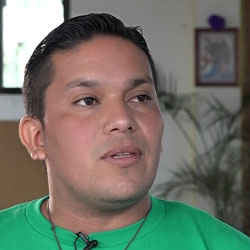Initiatives to reduce crime and violence —including community-focused outreach centers—are having an effect in certain neighborhoods in Central America, though much more work and time are required before anyone can claim victory, according to experts at the Regional Conference on Prevention and Education in Tegucigalpa.
“It is not enough to suppress the crime,” according to the declaration of the Regional Conference on Prevention and Education in Honduras. “It is essential, in the medium and long term, to work toward peace and coexistence in order to prevent violence.”
Environ 350 les élus, décideurs politiques, program implementers and the media attended the Regional Conference on Prevention and Education, organized by the Honduran Ministry of Security of Honduras. La conférence, an initiative of the Honduran Pro-tempore Presidency of the Système d'intégration centraméricain, drew together national, regional and international experts to share their experiences of what works in crime and violence prevention and discuss how to strategize implementation elsewhere.
At the conclusion of the two-day conference, Honduran President Juan Orlando Hernández told participants: “We are sending a message that we are waking up and are committed as a generation to take on one of the challenges we have faced through history. We will not stay silent and with our arms folded, as has happened in the last 15 ou 20 années, before the issue of safety and prevention.”
De la 350 participants, most of who stayed for both days of the conference, 100 came from outside Honduras, mainly from Central American countries and the Dominican Republic. There were also representatives from the US, South America and other parts of the world.
Creative’s outreach centers play a critical role
In the struggle to ensure safety and prevent violence, Latin America experts at the conference emphasized the need to reach children and youth before they became involved with gangs, as well as the importance of empowering the community to be involved and take action.
Salvador Stadthagen, Directeur de USAID’s Alianza Joven Honduras program, told conference attendees how Outreach Centers were designed to do both.
Au Honduras, 46 Centres de sensibilisation serve more than 28,000 youth and empower communities to engage and protect children and at-risk youth. Au moins 16 new centers will be opening this year. Through education and professional training programs, these Outreach Centers are breaking the cycle of violence for many Honduran communities.
These centers have received a great deal of support, particularly from the Deputy Secretariat of Security for Prevention, and by the local governments of the municipalities in which they are located. The Mayor of Tegucigalpa, Nasry Asfura, has recently committed to building more of them in the Honduran capital.
Dans Le sauveur, Outreach Centers are reaching an estimated 51,045 children and youth, Juan Jose Hernandez, a representative from Creative’s Crime and Violence Prevention Project in El Salvador, said at the conference.
“The centers are places of opportunity and hope in the hearts of communities,” said Hernandez, “and seek the development of children and youth.”
Similar centers have been set up in other countries like Panama to support efforts in violence prevention and provide opportunities for children and youth. The Outreach Centers are funded by the U.S. Agence pour le développement international, gouvernements hôtes, communities and the private sector.
Dans son discours, Stadthagen noted in particular the importance of empowering individuals in at-risk communities with the capacity to foster positive change:
“There are a lot of great people in the most at-risk communities in the region," il a dit. “We need to unleash their potential and look for strategies to engage them to participate and become protagonists of the positive changes those communities require. Developing volunteerism and training volunteers at the community level is one key strategy to achieve this.”
Creative’s Outreach Centers provide opportunities to engage young people and foster volunteerism.
President Hernández publically recognized the importance of Outreach Centers in his closing remarks. He also praised Les jeunes contre la violence, and requested that the other Central American governments support the youth movement in their own countries.
Creative co-sponsors & helps organize the conference
In addition to Hernandez and Stadthagen, other experts from Creative spoke at the conference to share best practices and experience in the field. Creative has been working in communities throughout Central America to develop tools, techniques and practices that engage both policymakers and communities in the prevention and reduction of violence.
Creative also co-sponsored and helped organize the conference. By sharing its network of contacts working in education and prevention activities in the region, Creative helped ensure that the conference was comprehensive and inclusive.
The conference provided the opportunity to share a variety of experiences and lessons learned, deepen alliances and create new alliances between attending organizations. The Conference also allowed Creative’s staff, partenaires, and allies to further their knowledge on Prevention and share their successful approaches.
“Creative has a very solid Education practice. Joining our experience in prevention and citizen security with our experience in education issues such as [école] drop-out, an important risk factor for violence for example, is important for developing more effective prevention programs,»Explique Stadhagen. “The fact that this Conference explored the nexus of prevention and education was a great opportunity.”
Guillermo Céspedes, former Deputy Mayor of Los Angeles and currently the Deputy of the Proposer plus programme, spoke about Creative’s secondary prevention project in Honduras.
Financé par l'USAID, Proponte Más will identify and work with 800 families and 8 à 17 year olds who are empirically at the highest risk of joining gangs. Il repose sur une réussite pilote de 100 familles dans la capitale hondurienne.
During a separate panel session, Fabien Bendersky, un psychologue clinicien d'Argentine et consultant créatif, discussed the large and untapped potential of sports for prevention and reduction of violence among youth.
Soccer programs Bendersky has organized in El Salvdor have proved effective in teaching empathy, developing self-discipline, improving critical and reflecting thinking, increasing self-confidence, decreasing violence and absenteeism and improving young peoples’ ability to meet the challenges of daily life.


